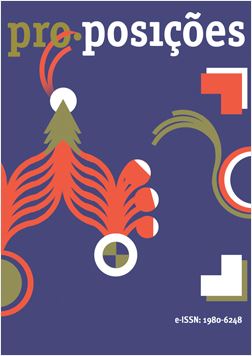Abstract
The present work is a theoretical study derived from a literary integrative review, which aimed to establish parallels between Vygotsky's immersion in analyzes of children with disabilities and his condition as a Jew as another, given the anti-Semitic context surrounding him. It begins by highlighting the historical and dated character of his contributions, demarcating the difficulties faced by Vygotsky when it comes to living in an idealized context so that he would be taken as a foreigner in his own land; it also points out the impacts that the 1917 Revolution had on his psyche and choices, given the dimension of this phenomenon. It ends by asserting that his predilection for analyzing issues involving children with disabilities in his texts is linked to his experience as a Jew in an anti-Semitic context, a relationship not yet explored in the literature.
References
De Paula, S. R. V. (2019). LS Vigotski e a cidade de Gomel: uma teoria histórico-cultural das vivências Educação em Foco.
Deutscher, I. (1968). A revolução inacabada: Rússia 1917-1967. Civilização Brasileira.
Feigenberg, I. M. (2000). From Gomel to Moscow: The beginning of L. S. Vygotsky creative way. S. F. Dobkin's memoirs L. S. Vygotsky's early essays The Edwin Mellen Press.
Feuerbach, L. (2012). Para a Crítica da Filosofia de Hegel Liber Ars.
Gardou, C. (2005). Quais os contributos da antropologia para a compreensão das situações de deficiência?. Nuances: Estudos sobre Educação, Presidente Prudente, v. 12, n. 13. Disponível em: https://revista.fct.unesp.br/index.php/Nuances/article/view/1694 Acesso em: 31 maio de 2022.
Gilbert, M. (1993). Atlas of the Holocaust William Morrow & Company.
Johnson, S.(2011). Pogroms, peasants, jews: britain and eastern europe's "Jewish Question" 1867-1925 Palgrave Macmillan.
Klier, J. (2011). Russians, Jews, and the Pogroms of 1881-1882 Cambridge and New York, Cambridge University Press.
Kotik-Friedgut, B., & Friedgut, T. (2008). A man of his country and his time: Jewish influences on Lev Semionovich Vygotsky's world view. History of Psychology, 11(1), 15-39. https://doi.org/10.1037/1093-4510.11.1.15
Kotik-Friedgut, B. (2015). Vygotsky & Bernstein in the Light of Jewish Tradition Academic Studies Press.
Lordelo, L. da R. (2007). A consciência como objeto de estudo na psicologia de LS Vigotski uma reflexão epistemológica. [Dissertação de Mestrado no Programa de Pós-Graduação em Filosofia]. UFBA, Bahia.
Luria, A. R.(1986). Pensamento e linguagem: as últimas conferências de Luria (D. M. Lichtenstein & M. Corso, Trad.). Artes Médicas.
Marx, K. (1989). Elementos Fundamentales Para la Crítica de la Economía Política (Grundrisse) (16. ed.). Siglo Veintiuno.
Marx, K., & Engels, F. (1980). A ideologia Alemã (Vol. I., 4. ed.). Editorial Presença; Martins Fontes.
Moron, S. I. (2017). Subjetividade e constituição do sujeito em Vygotsky Vozes Limitada.
Prestes, Z. (2010). Quando não é quase a mesma coisa: análise das traduções de Lev Seminovicht Vigostki no Brasil repercussões no campo educacional [Tese de Doutorado, Faculdade de Educação, Programa de Pós-Graduação em Educação]. Universidade de Brasília, Brasília, DF.
Riasanovsky, N. V. (1984). A History of Russia, (4th ed.). Oxford University Press.
Shakespeare, W. (1999). Hamlet. Príncipe da Dinamarca L&PM Pocket.
Smagorinsky, P. (2012). Vygotsky, “Defectology” and the inclusion of people of difference in the Broader Cultural Stream. Journal of Language and Literacy Education [Online], 8(1), 1-25. http://jolle.coe.uga.edu/wp-content/uploads/2012/05/Vygotsky-and-Defectology.pdf
Sobkin, V., & Klimova, T. (2016). The unknown Vygotsky: on the experience of a literary translation from Hebrew. Journal of Russian & East European Psychology, 53 (6), 1-31.
Toassa, G. (2006). Conceito de consciência em Vigotski. Psicologia USP [online]. 17(2). 2, 59-83. <https://doi.org/10.1590/S0103-65642006000200004>.
Tunes, E., & Prestes, Z. (2009). Vigotski e Leontiev: ressonâncias de um passado. Cadernos de Pesquisa [online] 39(136), 285-314. <https://doi.org/10.1590/S0100-15742009000100014>.
Volkogonov, D. (1999). Autopsy for na empire: the seven leaders who built the soviet regime. Free Press.
Vygodskaya, G. L. (1995). His life. School Psychology International, 16(2):105-116. doi:10.1177/0143034395162002
Vygotsky, L. S. (1989). Fundamentos de defectologia Editorial Pueblo y Educación.
Vygotsky, L. S. (1991). Formação social da mente (4. ed.). Martins Fontes.
Vygotsky, L. S. (1993). Obras escogidas (J. M. Bravo,Trad., Vol.2). Aprendizaje Visor.
Vygotsky, L. S. (1999). A tragédia de Hamlet, príncipe da Dinamarca (1. ed.). Martins Fontes.
Vygotsky, L. S. (2001). A construção do pensamento e da linguagem (P. Bezerra, Trad.). Martins Fontes.
Zavershneva, Е., & Van Der Veer, R.(2018a). Not by bread alone: Lev Vygotsky’s Jewish writings. History of the Human Sciences, 31(1), 36-55.
Zavershneva, Е., & Van Der Veer, R. (2018b). Vygotsky's Notebooks: A Selection. Springer.

This work is licensed under a Creative Commons Attribution-NonCommercial 4.0 International License.
Copyright (c) 2023 Pro-Posições


